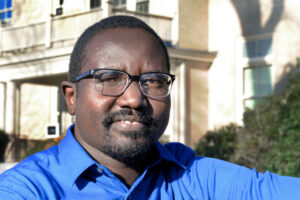Former refugee turns to higher education
Ph.D. student Samuel Garang Akau fled his home in South Sudan as an eight-year-old boy during the Second Sudanese Civil War; now, he’s pursuing a Ph.D. in public policy. Many of his family members, including his parents and a brother—died during the war that lasted more than two decades.

“You’ve got to do something and focus on what you can change,” Akau said. “For me now, for people in the diaspora, you have to do what you can do and not be overwhelmed.”
The war between the Sudanese government and the Sudan People’s Liberation Army lasted 22 years. Akau is among the more than 20,000 refugees often referred to as the Lost Boys of Sudan.
He eventually made it to a refugee camp in Kenya with a group of unaccompanied minors and reunited with an older brother. The two came to the United States by way of a refugee program, and Samuel attended Stanford University. Oftentimes, Akau said, refugees in Kenya only had one meal per day, sometimes leaving them too hungry to read or to study.
Before pursuing his master’s degree at American University, Akau served as a deputy dean at the University of Juba, an English-speaking university founded in the 1970s and located in South Sudan, where he started a public service initiative. At the university, he focused on entrepreneurship and fostering leadership skills.
“Empowering young people and giving them the skills they need to serve is going to be the way forward,” Akau said. “Not many South Sudanese have the training and privilege to be able to engage at that higher level.”
Pursuing graduate work
Work at the university spurred him to pursue graduate work at Carolina. The public policy program appealed to Akau because of its strong focus on economics, in addition to how it balances political science and international relations.
“Policy is not a straightforward thing,” Akau said. “There’s a human element to it, and when the human element is involved, there’s also going to be politics.”
While he pursued his master’s degree, Akau noted a lack of human capital, strong government infrastructure, and analytical capacity in South Sudan.
“At the end of the war, there was fear that signing a peace agreement is not enough,” Akau said. “You have to address some of those drivers of war. Otherwise, it’s likely that countries will go back to war.”
Akau hopes to use what he learned at Carolina in order to continue his capacity to provide insights into the country’s future policies.
For him, that includes the Sawa Sawa Network, which he founded in 2019. The initiative uses digital tools and emerging technologies to build peace and community in South Sudan and its diaspora.
“That’s the goal, especially to be involved in that high-level engagement to impact the policy. You need a certain level of training and tools to do that. My hope is that my studies here at Carolina will help me gain these skills.”
Interdisciplinary learning
Akau is also a fellow with the Weiss Urban Livability Fellowship program, offered by The Graduate School. The fellowship program supports talented graduate students from all areas of campus who have an interest in urban livability.
“One of the challenges we face in South Sudan is the mindset of service,” Akau said. “I want to go back to South Sudan and serve whether that’s with an international organization or with the government.”
Akau said that the fellowship allows him to have stability and to focus on his studies. He also credits it with bringing together a diverse group of students.
“We have these seminars where we talk about critical issues that are related to urban livability. We get to really see how people are thinking differently about critical problems and things they are passionate about,” Akau said.
One aspect of Akau’s research is the role of social media and how it can polarize communities. In particular, he’d like to focus on how social movements empower people to share their perspective and exchange ideas that move toward the greater good.
That’s part of what he’s already doing at Carolina—benefitting from interdisciplinary conversations among graduate students from all around the University. Akau is also pursuing the Graduate Certificate in Innovation for the Public Good, a joint initiative offered by Innovate Carolina. As a global citizen, he’s preparing the next generation of leaders in South Sudan and beyond.
“I would have never thought that this was going to be my trajectory. For me, to be able to gain a Ph.D. and do something that impacts others’ lives; it’s what makes life meaningful.”
